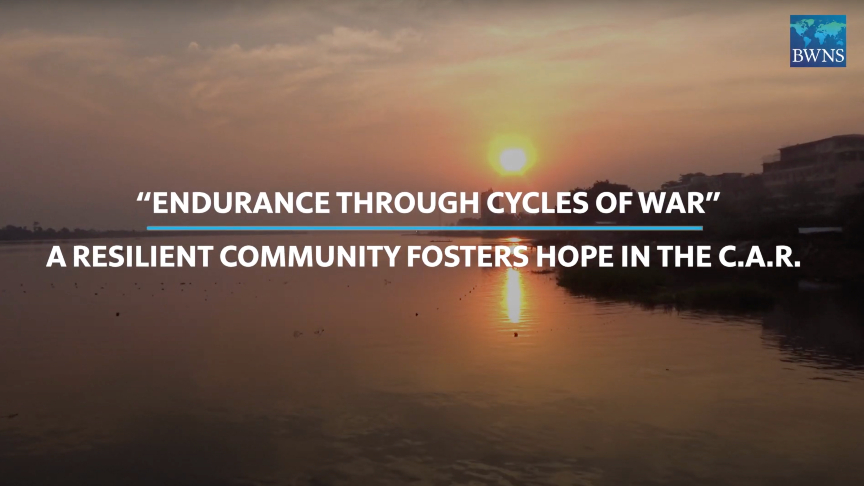In an era characterized by tumultuous upheavals and relentless conflict, the Bahá’í teachings offer a profound framework for understanding resilience and hope amidst adversity. But how does one cultivate perseverance in the face of such strife? This query invites contemplation, particularly when we consider how Bahá’í values can serve as bolsters for communities emerging from cycles of war.
To explore this theme, we must first comprehend the essence of endurance as articulated within the Bahá’í framework. The Bahá’í Faith emphasizes the idea that the trials and tribulations faced by humanity are not merely obstacles to navigate but are, in fact, instrumental in forging the spiritual and social development of individuals and communities alike. This perspective posits that challenges, including those arising from conflict, can serve as catalysts for fostering resilience.
Interconnected with the notion of endurance is the principle of unity. Bahá’í teachings assert that humanity is an indivisible entity. This principle must be at the forefront of community resilience, especially in regions ravaged by division and discord. Indeed, the emphasis on unity implores individuals to transcend their differences and unite in a common cause—a critical step towards healing and rebuilding after conflict.
Moreover, the cultivation of hope acts as a beacon during dark times. Bahá’í writings emphasize that hope should not be misconstrued as mere optimism but should be viewed as a vital force that propels individuals and communities towards a brighter future. In war-torn regions, the act of fostering hope can manifest through community gatherings, dialogue, and shared activities which reinforce a collective identity, thereby fortifying the bonds between individuals.
Yet, while reflecting upon these principles, we encounter an intriguing challenge: What happens when hope seems fleeting, and individuals feel isolated in their struggle? The answer lies in the symbiotic relationship between community resilience and individual fortitude. Engaging communities in collaborative efforts can invigorate a sense of belonging and shared responsibility, thus providing emotional support for those grappling with despair. This highlights the role of active participation in community endeavors as essential for maintaining a hopeful outlook in the face of adversity.
Another salient aspect of Bahá’í teachings concerning endurance is the pursuit of knowledge. The acquisition of knowledge serves as a transformative tool that equips individuals with the strategies necessary to withstand challenges. This can range from practical skills that enable better livelihoods to broader educational endeavors that foster critical thinking and problem-solving abilities. For instance, educational programs established in post-conflict settings can significantly enhance an individual’s capacity to contribute meaningfully to their community, thereby reinforcing resilience.
Furthermore, the practice of forgiveness emerges as a powerful component in the landscape of resilience. Forgiveness does not signify the absolution of wrongdoing but rather signifies a conscious choice to move forward, liberating oneself from the shackles of bitterness and resentment. Bahá’í teachings elucidate that embodying a forgiving spirit can pave the way for reconciliation and renewed relationships, crucial for rebuilding trust within communities fragmented by war.
The narrative of endurance through cycles of war is incomplete without a discussion on the paramount importance of social justice. A resilient community is one that actively seeks equitable treatment and opportunities for all its members. Bahá’í teachings advocate for the dismantling of prejudicial structures and the promotion of inclusivity. It is through this lens that individuals and communities can collectively address grievances born from conflict, laying the groundwork for a more just society. This imperative for justice not only cultivates endurance but also nourishes the very roots of hope.
Equally significant is the role of spiritual practices in cultivating resilience. Engaging in prayer, meditation, and reflection allows individuals to draw upon inner strengths, offering solace and a sense of peace amidst chaos. In Bahá’í thought, these spiritual disciplines create a direct line of communication with the Divine, providing assurance and reinforcing faith during tumultuous times. Thus, spiritual practices serve as a foundation upon which endurance is built.
Moreover, storytelling can serve as an invaluable tool for memory, healing, and communal bonding. The act of sharing experiences and narratives related to conflict can foster understanding and empathy among community members. Through storytelling, individuals can reclaim their identities, recount their journeys through hardship, and inspire others by illustrating the triumphs that follow adversity. This not only serves to enhance communal ties but also instills a collective memory that honors the struggle endured, further embedding hope into the community’s narrative.
As we navigate the complexities of resilience in the aftermath of conflict, we are reminded that each individual’s contribution is essential to the collective strength of the community. The Bahá’í teachings illuminate pathways for fostering hope and endurance, urging us toward a future characterized by unity, justice, and a shared commitment to addressing the needs of all. Amidst challenges, it is not merely survival that is at stake, but the thriving of humanity as a whole—a vision worth striving for, fueled by resilience and hope.
